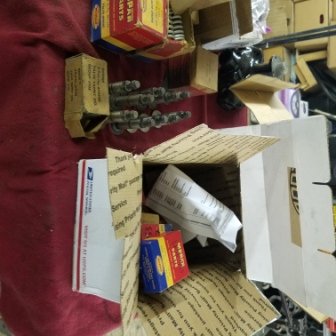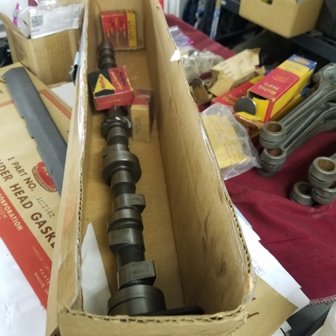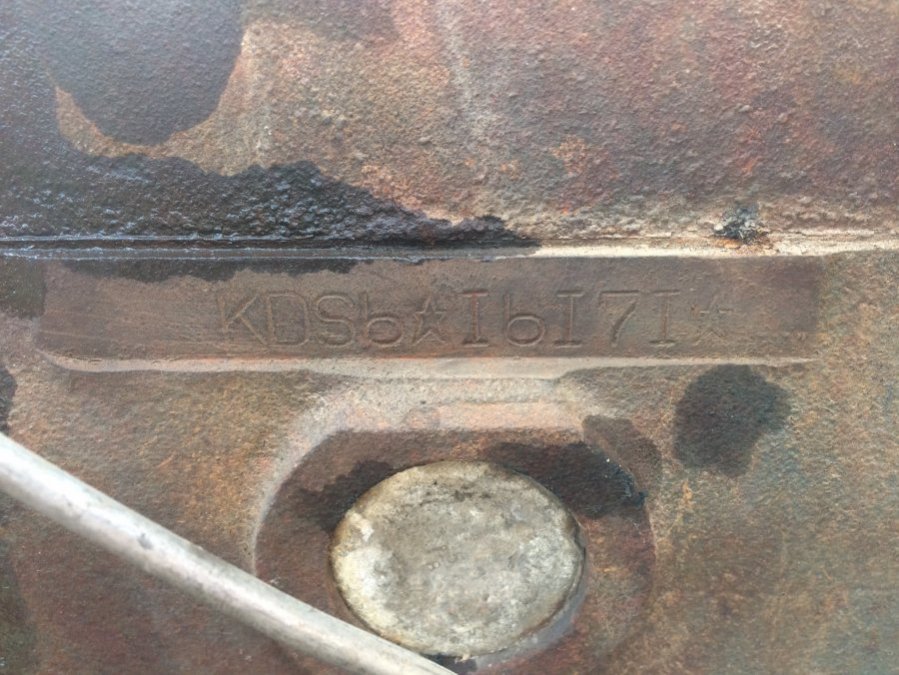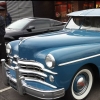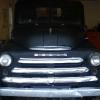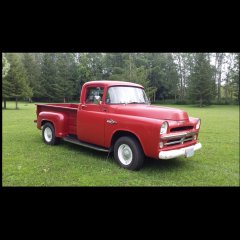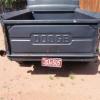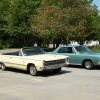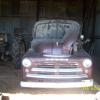Search the Community
Showing results for tags 'engine'.
-
I recently started work on my grandpa's what I think is a 1951, dodge with the 3 rear windows. As far as i know it's a 1 and 1/2 ton truck. The engine has Spitfire on the head. I don't know anything else about the engine other than it may be a 230 and it is stuck, but I think I can get that taken care of. I need help on truck identification, is it a b-3 or... I would also like any information on the brake system and oiling system. I would like to keep it mostly original with the exception of exhaust and maybe a dual carb setup. I have read a lot on here, but I would love to learn more, to get this old truck running again. looks rusty but its thin surface rust.
- 33 replies
-
- spitfire engine
- engine
-
(and 1 more)
Tagged with:
-
The car - 1949 Wayfarer with the 230 flathead 6 of course.... Car had been sitting for two weeks before this was found, drove normally before with no white smoke from tailpipe. Radiator slightly low, but not drinking coolant at an alarming rate. I removed the carburetor for a rebuild last night, and what do I see pooled in the intake manifold? Coolant. It looks like the coolant is originating from the runner that feeds the center two cylinders (3&4). I pulled the spark plugs, all look OK (slight rich, but not steam-cleaned). All valves that I could see also show normal operating conditions. I understand that most manifold studs pass into water jackets, but am not sure about head studs. Is it likely that I somehow have coolant seeping past a stud and pooling in the intake manifold? Or maybe a cracked/misdirected water distribution tube? Or does anyone believe this could be something more severe, like a cracked block? All input is appreciated. Thank you.
- 26 replies
-
- engine
- cooling system
-
(and 2 more)
Tagged with:
-
I converted my 1950 Plymouth Deluxe 251cc Flathead from a 6 volt to a 12 volt system. Got the alternator from a friend replaced the original generator with it. The alternator charges well and has a module / sensor to determine if charging is needed. The problem: when the engine is at idle and I remove the positive battery post, the engine runs so much smoother. Put the cable back on the battery post and the engine labors quite noticeably. Revving the engine with the battery post off, it revs well and responds quickly. Revving the engine with the battery post on, is labors and it revs noticeably slower. Any thoughts?
-
Tonight there was a small old 1938 Sedan in Canada that once again, propelled itself. I am tickled to share this brief clip tonight. One more has been checked off my bucket list. Many of ya’ll have experienced this. It sure feels good. A fresh new 237 engine. Now I just need to go find where I put the brakes. I seem to have forgotten to install them. No workee! ?
-
Hello, Is possible to get more informations only with body / engine number? I own a 42 Dodge and serial number tag is not there. Thanks
-
Hello to all, I have been reading for a while. looks like a great group of people. Hope some of can help. My 48 Desoto's engine is stuck rust in one cylinder. what can I use? I have used many types of oils. Next is molasses?
-
-
I had my head milled, more than normal (.060) because I wanted to do some chamber work. I marked the gasket edge on the head and ground the area near the exhaust valves back closer to the gasket edge to unshroud the valves and did a little smoothing. Checked the resulting size and arrived at 70cc. I measured the head gasket that will be used and estimated (guessed) its' compressed thickness at .040 so it should add 8cc or so. Compression ratio = (cylinder displacement+chamber volume+head gasket volume) / (Chamber volume+head gasket volume) My numbers, all in cc's , (628+70+8) / (70+8 That puts me at 9.05:1. Close to maximum I think for a flathead. Probably be a premium fuel burner. Now the questions. How do those numbers compare to any measurements you folks have taken? Does the calculation above make sense to the collective wisdom here? There is a more smoothing that could be done to gain a few cc's if needed. edit to add: This is a 56 Plymouth 230 head. These were advertised originally at 8 or 8.1:1. With the .060 I removed they must have been way under the spec'ed ratio from the factory as the amount removed in the chamber work was not all that much.
-
FLATHEAD ENGINE questions for 1948 Plymouth special deluxe
vinny1416 posted a topic in P15-D24 Forum
I have a 48 Plymouth special deluxe and havent been able to get this motor to start. It cranks and I put gas in the carb trying to get it to start. Though when I was working on it my stud that the positive cable bolts to got really hot. Wire isnt hot but just the bolt. I get the motor to crank and sounds like it wants to start because it does pop but cant get it to run. -
After much delay my D-24 230 has begun assembly. Years of scrounged ( and new ) parts are laid out for inventory. Good thing , I was short 4 correct exhaust valves. They arrived today. Cam cleaned up nicely, and the crank I saved from a 1948 cracked block measured within Standard specs. Hope next week continues this pace.
-
-
I am working on a 1937 Dodge 1/2 ton pickup with a 218ci 6-cylinder. The engine number stamped on my block is: T38-8085. The engine spun the #2 rod bearing and cracked the crankshaft. I have located a crankshaft and set of rods out of a 1953 Dodge B4B with a 218 ci engine, and I am hoping to use this crank as a replacement. The B4B engine is stamped with T306*I57323*. Unfortunately, I do not have the crankshaft casting numbers readily available. My question is, are these crankshafts interchangeable? Or can this only be determined from the crankshaft casting numbers?
- 2 replies
-
- engine
- crankshaft
-
(and 2 more)
Tagged with:
-
So I am brand new to the forum. I am wrapping up a restoration on an MGB and am just starting to restore a 1948 B1B. A bit crazy going from a roadster to pickup, but I have always loved the old pickups. Anyway, the ‘48has a seized flathead six. Absent pulling it apart, I have done all the standard tricks to break it loose. Based on the Engine number it appears to be out of a Plymouth as the number begins with a P. I have located, for a reasonable cost another flathead six that runs and has good compression, but it has an engine number I cannot seem to track down KDSb*IbI7I. The “b” could be a six, but the KD is totally throwing me off track. I attached a picture for reference. Does anyone know what this came out of? I am assuming it is a 218 thanks
-
Hi guys. advice required. I'm about ready to pull the motor out of my '49 Dodge wayfarer. The transmission is 3 speed manual with fluid drive. I know I have to separate the engine and trans, before I lift the motor out, but I need to know whether I have to remove the transmission, and leave the fluid coupling/clutch and bell housing on the motor, and then remove that unit after the motor is out ??. If I tried to remove the trans WITH the bell housing/clutch etc, the motor would become unstable because the bell housing casting sits on the rear mounts. Looks like common sense, but any advice welcome. Also, when lifting the motor out, will it be necessary to remove the radiator yoke (mounting panel ?), or, should it clear ? (using an engine hoist, not overhead lifting block and tackle) Regards, BB.
-
Thinking about removing the engine in my B1D-126 over xmas break and was wondering if anyone here has any tips or suggestions on the removal? Thanks!
-
Hey folks, I got a 46 WC 1/2 ton, and I'm wanting to know how to tell what year the engine in it was made. I'm thinking it's a 230, but the serial number was filed off for some reason. I heard the year it was made should be stamped below the distributor, and on this engine it says A1 then right below that it has 6 5 7. So would this engine have been made in June of 57? Any help is appreciated, thanks.
- 12 replies
-
Looking for some help to decipher and ID a 25" flathead engine I'm looking at. I do know this is a Canadian engine and am being told by the seller that it is a 1960 251ci but I'd like to confirm the year of this engine. I am almost certain that it is a 251ci as when I looked at the engine we pulled the head and the measurements match those of a 251. The numbers are as follows ID stamp pad P6D1 - 33657C Block casting/part number 1402529 Block date stamp E 19 0 and the number arrow is pointing at the #8 Head casting/part number 1632389 Head date stamp D 11 0 I have tried multiple web searches to try to decipher this but there doesn't seem to be much out there on the Canadian number on these things. This engine is a rebuilt with very low mile on it since the rebuild, it is in really good shape and complete ready to drop in with a very reasonable price. The engine did come out of a car and has the fluid drive bell-housing with the coupler/convertor and clutch as well as a Pertronics 12V ignition system (I don't know if I will actually use this ignition as the points have been very dependable but it comes with the engine). The deal seem way too good to pass up and will be a much less expensive fix for the sick flathead in my Fargo. Any help would be greatly appreciated! I'm not going for a concourse resto so the year of the engine doesn't make a huge difference (plus I plan to keep the one currently in the truck which is the original engine to the truck) this more for my own piece of mind and knowledge.
-
I'm trying to stay with all original engine colors so I'm wondering about the various engine and transmission parts colors. Here's what I think the colors should be... (but some are pure guesses on my part)... Black: 1. Oil Filter Canister / 2. Crankcase Ventilation Tube / 3. Distributor / 4. Front Motor Support Bracket / 5. Fan / 6. Oil Pan / 7. Emergency Brake Drum Argent (Silver): 1. Block / 2. Head / 3. Oil Pump / 4. Water Pump / 5. Bell Housing / 6. Transmission / 7. Dip Stick Tube Did I miss anything?
- 13 replies
-
- engine accessories
- engine color
-
(and 3 more)
Tagged with:
-
I had these photos of a '41 Plymouth and noticed the item that appears to be involved in the cooling system. Has anyone here seen this before and can identify it? John R
-
Hi everyone - looking for feedback on my recently acquired '51 B3B pickup. Not sure the last time that it had run - but on compression test the #2 cylinder I'm getting nothing from (absolutely 0). the others are all around 85 to 110 PSI. Looking down the spark plug hole I do not see anything moving when I crank over the engine (which I presume I'm looking at the cylinder? v's a valve) Depending on costs to repair I'd be tempted to switch out to another frame / engine combo - but checking in to see if I missed something easy / cheap to fix thanks, Jason.
-
As I’ve been reading many of the forum topics lately with great interest, I’ve had many of my questions addressed, and those that haven’t, have been resolved by other’s direct input to my questions, which I’m grateful to those who’ve responded to my (hopefully not inane) questions. With that having been said, I have another question: I’ve always tho’t that the engine in this car (’46 Plymouth Special DeLuxe Club Coupe) isn’t the original. The first tip-off was that it’s painted blue rather than silver. But, the most convincing factor in my conclusion is that, upon reading the service manual, and the owner’s manual, is the presence of a dashpot (for what I can only assume is for the fluid-drive setup, and available on the Dodge and/or DeSoto, but not the Plymouth)with linkage connected to carburetor that supposedly keeps the engine from stalling during deceleration. Should that be the case, would the engine still be a 218ci, or would it be some other size? Many thanks in advance to those who provide input. Thx.
-
New to this stuff: I just got a 56 Truck and I want replace the stock 3 speed flathead 6 with a 360 Mopar and overdrive. Will I have to change the differential? What else will I have to change? I am trying to estimate the total cost to do this. thank you for your help
- 30 replies
-
- 1
-

-
- engine
- transmission
-
(and 1 more)
Tagged with:
-
So, yet another question!!! this truck has new oil in it brand new almost! never even ran engine on the oil. and the engine had no water in it (in the cooling system) so my oil is milky white like it has water in it. I just think its a bad head gasket seal. but heres my main problem i know they dont push a lot of oil pressure and ive never exactly got the engine to run but it has oil in it like i said but even after the hours ive spent cranking it over there seems to be absolutely no oil in the oil filter how is that possible?? does the engine only push oil to it if its warmed up? what can you tell me about this issue because im days from tuning my engine and id hate to seize the engine!!! please help!! again i know nothing about how this oil system works!!! my filter was replaced about 2 years ago doesnt seem like oil has ever touched it??
-
I've completely torn down the engine on my 1950 Chrysler Windsor Sedan, as the engine was seized when I bought it. I have yet to collect any precision measurements (I don't own any machinist's tools), but I did notice a few things as I disassembled the engine, and I'd like to know if any of you have any advice. Primarily concerning me right now is the valve train. While some of the valves slid right out of their guides after I had removed their springs and retainers, there were a few that were so stubborn, they required vice grips, penetrating oil, and nearly an hour of twisting and tugging to remove. What's odd, is that aside from the damage inflicted by my vice grips, I couldn't find any apparent deformities on the stubborn valves. I'm wondering at this point if there's any good way to determine if the problem was my valves, valve guides, or both. Additionally, after finding what's available on Vintage Power Wagons, I've been considering the possibility of installing modern valve seats and valves to allow for the use of unleaded fuel. I hope to one day drive this car daily, and don't want to deal with tracking down and adding a lead substitute at every fill-up. Does anyone here have experience in running these fatheads on unleaded? Do the original valves ruin themselves if you do? This is my first engine rebuild, and any advice on the subject is greatly appreciated.
-
alright guys you all know i have restored a 1950 dodge pickup its an all original truck with numbers matching everything so i have another truck for parts its a 1948 but its engine and drive train are pretty much gone but i ran into yet another free truck a 1979 dodge power wagon w150 it has a 360 v8 in it that runs a little rough but it sat for 15 years and i got it to fire rite up the truck howerver is in decent shape but the dash and everything is ruined and the floor has decent rust. so what im thinking is i have two options junk the 48 and use that cash to fix the 79 and have just a nice power wagon that i can use to junk around with and play...or i could take the body off the 48 and do a simple and i mean simple cab swap no ac no cruise control or what not just power brakes and power steering etc i think it could be a fairly simple job since the 48 is a flat bed truck so i wont have to worry about the wheel base and track width because the truck has a mild lift to it. what do you guys think of this idea and is there anyone out there whos done a similar project this will probably be done in my highschool shop id imagine some simple body mounts since theres only 6 bolts that hold the trucks cab and fenders to the frame so i dont imagine it would be to difficult and then ill just wire up my own wiring harness only using the essentials lights brakes fan and on of switch pretty much basic.. the cruise control and stuff would be nice but lets face it i dont need it... im not sure i love the style of the 79 as it is its just kinda a rough body for what it is...just give me your thoughts on what you think i should do thank you!! also im only 17 so tips would be great !!!

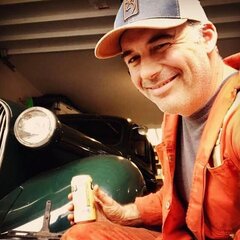
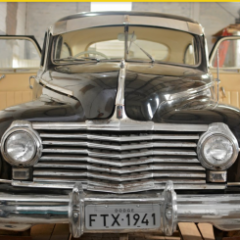
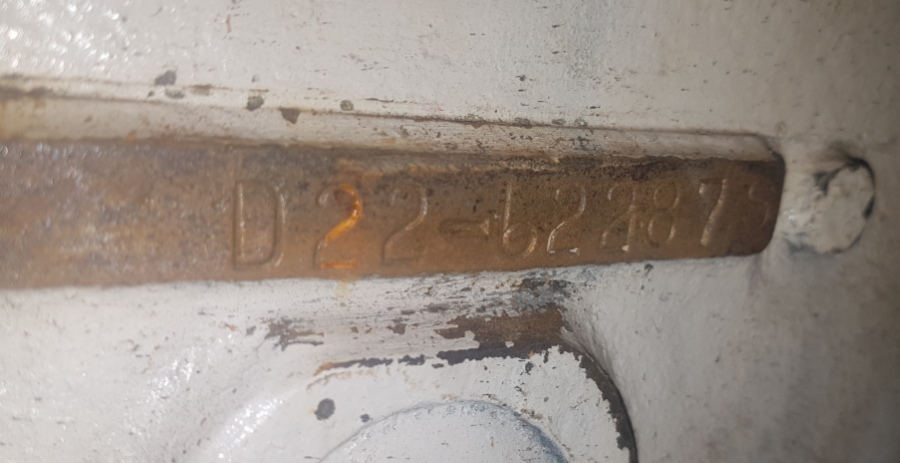

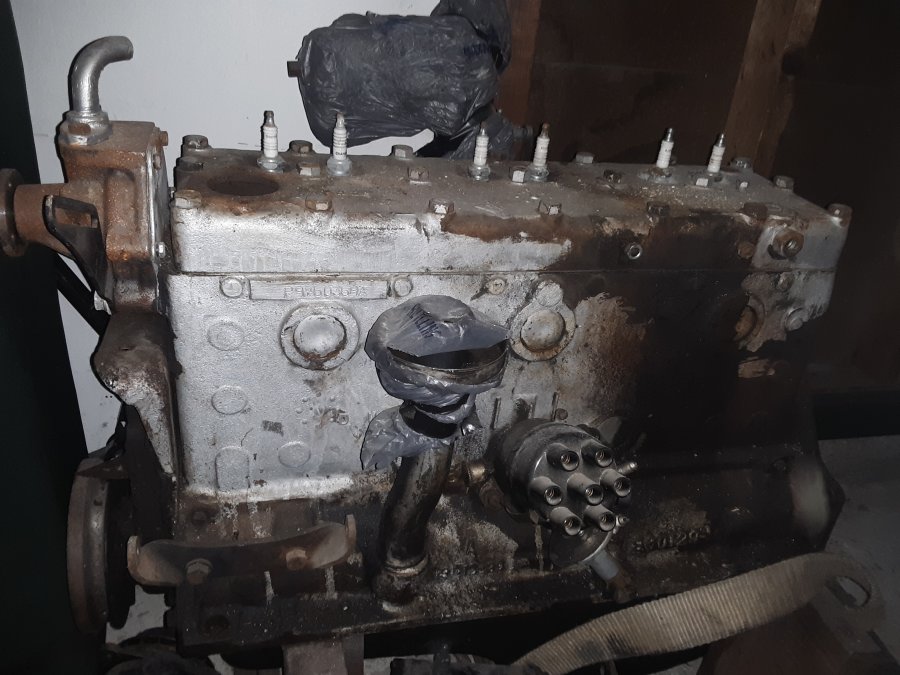
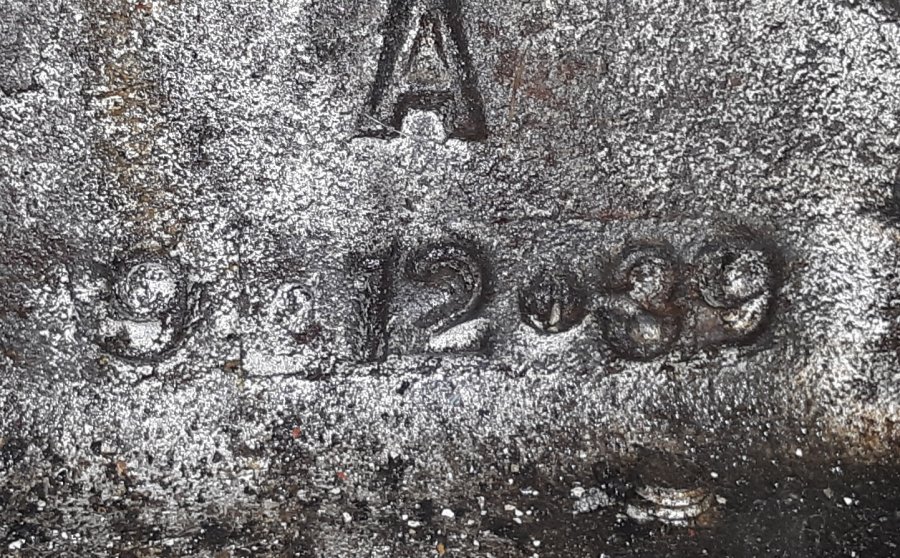
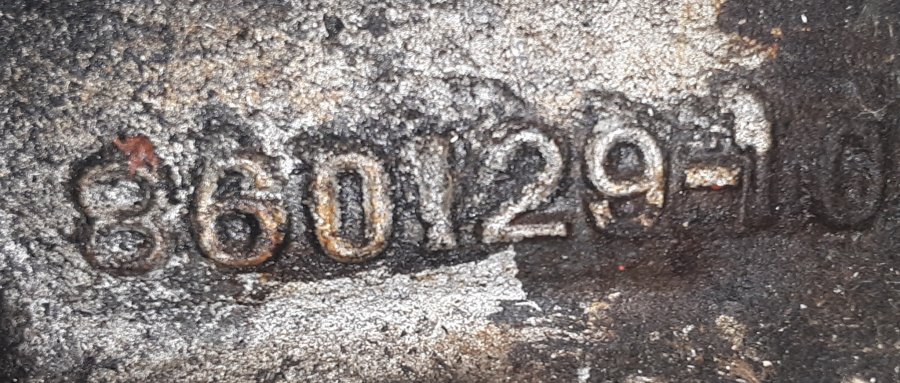


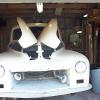

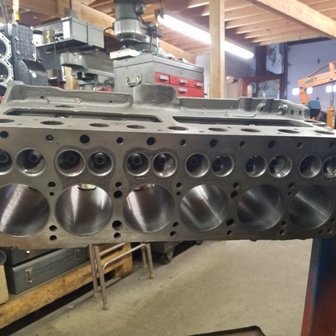
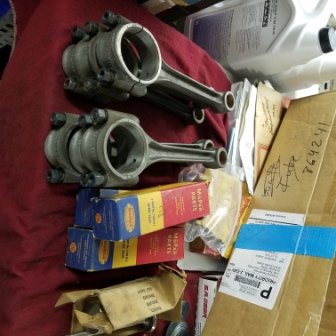

.jpg.c4717335d9e3e83479133a8b38f3983c.jpg)
